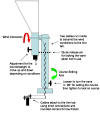Sailboat Self-Steering Gear
We built a trim tab on our aft hung rudder and have sailed well over 15,000 miles using it.
Two things prompted us to embark on building our own self-steering gear: Cost and Hull Shape. The cost is probably an obvious motivator for anyone who has priced a new self-steering system. But our hull shape made the commercial gear less attractive.A good Self-steering system can be homemade and it can turn an ordeal on a rough sea into an adventure. How you go about building the system depends on your boat. Our boat is what is known as a double-ended sailboat. This means that it has a similar shape whether we are coming or going. We also have an rudder that hangs on the back of the boat. In sail-speak that's known as an aft hung rudder. Most of the equipment available today are servo-pendulum types of self-steering gear. These require a support structure so they can hang off the back of the boat. For our boat this added a lot of weight and cost. So we started looking for a better solution.
 Most
of the people who end up building their own system opt for a trim-tab type
of design. This is a low cost solution that can easily be built by
an amateur. However in reality, the design work took a lot more
investigation and research than I expected. So I've started
documenting our design procedure for the benefit of others.
Most
of the people who end up building their own system opt for a trim-tab type
of design. This is a low cost solution that can easily be built by
an amateur. However in reality, the design work took a lot more
investigation and research than I expected. So I've started
documenting our design procedure for the benefit of others.
Also we use an electrical autopilot to steer the boat using the trim tab. It works amazingly well in all the conditions we've encountered, even surfing down 12 foot seas.
The cost of the overall system has been about $550. This includes metal, wood, welders, bearings and clamps, but not my time.
GET PART 1 FOR FREE
Learn the following:
- Why use a trim tab
- How big should it be made
- Detailed calculations for constructing the NACA 0010 foil
- Detailed photos and descriptions for building the trim tab
- How to mount the trim tab and the details of each strut, including bearings.
GET PART 2!
Written over a period of 18 months and 5,000 miles of sailing, Part
2 contains the following information some of which is not available
anywhere else:
- The relative motions of the wind vane system
- Our unique method for testing system stability (without even leaving the slip)
- See 5 different designs using the autopilot and a trim tab with detailed photos, drawings and an analysis of each design tested at sea
- Understand how to make your design flexible and how to steer a big boat using a tiny autopilot by taking advantage of the trim tab's mechanical strength
- Learn about the pitfalls and how to avoid them in your design
- Over 40 pictures and drawings showing real systems at work
- See several wind vane systems at work and learn about the ways to make them flexible in both gain and feedback so they can be adopted to your boat.
FREE PREVIEW: To preview Part 2's Table of Contents, List of Figures and Tables for free here, before you decide to buy a copy.
Part 2 is pretty big (60+ pages), and everyone and their dog downloaded Part 1 for free which drove up our bandwidth. So to help offset these costs, Part 2 requires a $5 fee from Pay Pal (you can use your credit card) and a link will be emailed to you.
Click on the PAY PAL icon to go directly to Pay Pal and make your payment. Then select RETURN TO MERCHANT after paying to get your document.
